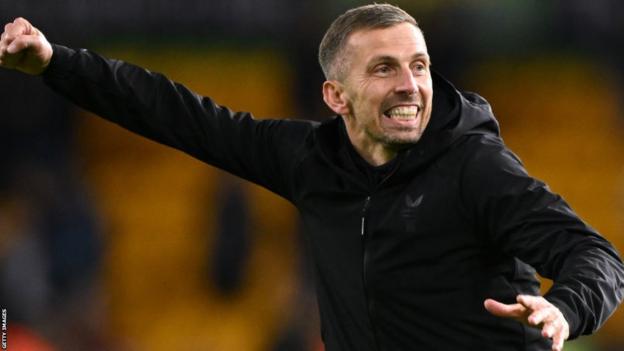[ad_1]

Wolves look set to avoid breaches of Premier League spending rules despite recording a loss of £67.2m for the financial year to 31 May 2023.
That figure follows on from a loss of £46.1m for the previous 12 months.
Former boss Julen Lopetegui was not allowed to spend heavily last summer, as Wolves tried to stay within Premier League profit and sustainability rules.
Clubs can lose a maximum of £105m over a rolling three-season period, or £35m per campaign, before facing sanctions.
Any clubs breaching those rules are at risk of a fine or a points deduction.
Lopetegui walked out six days before Wolves’ opening Premier League match, having become frustrated with the club’s summer recruitment strategy. His replacement, Gary O’Neil, has guided Wolves to ninth place in the league and to the FA Cup quarter-finals.
Wolves avoided a charge for breaching the financial rules in 2023. Everton and Nottingham Forest were the only top-flight clubs charged, and both face hearings this month.
While the losses submitted to the Premier League – covering the period from 1 June 2022 to 31 May 2023 – are slightly smaller than in the actual accounts, as certain items can be discounted under league rules, Wolves were among the clubs needing to take special care to ensure they didn’t risk a points deduction.
Everton’s initial 10-point deduction, subsequently reduced to six on appeal, for breaches up to 2021-22, has focused minds.
BBC Sport understands Wolves believe they are set to be clear of breaches in 2024, albeit by a smaller amount than hoped, as the club decided to pay off long-serving full-back Jonny, who had been exiled from the first-team squad because of a breach of discipline.
Wolves’ published accounts show they made a net profit of £82.98m from player trading.
O’Neil had hoped to sign an experienced striker in the January transfer window but Wolves pulled out of a deal for a player in Brazil because of unexpected demands from an agent.
Wolves’ accounts show that non-player payroll costs were £14.5m higher than the previous year, because of compensation paid to head coach Bruno Lage following his sacking in October 2022 and Lopetegui’s increased wages.
Chinese owners Fosun invested £64m during 2022-23, and have since put in a further £18m. It is understood these payments have been made initially in the form of loans but with the intention of turning them into equity.
Over the period in the most recent accounts, Wolves spent a net £160.7m on players, initially to bolster Lage’s squad and then to bring in Mario Lemina, Pablo Sarabia and Joao Gomes as Lopetegui steered Wolves away from relegation trouble following his arrival in November 2022.
Wolves’ overall wage bill rose from £120.5m to £141.5m, with turnover increasing from £165.66m to £168.57m.
It is anticipated this will rise during 2023-24 thanks to a combination of prize money earned from a likely higher Premier League placing, more live television appearances and a run to the FA Cup quarter-finals.
It is also understood every clause in Diogo Jota’s record move to Liverpool in 2020 has now been triggered, taking the overall fee to £50m.
By Simon Stone
Source link




